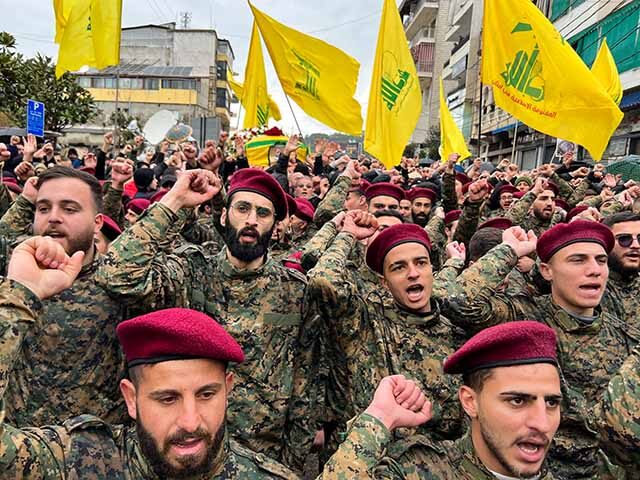The Israel Defense Forces (IDF) announced Tuesday that they had successfully eliminated Hezbollah’s top envoy to the Bashar Assad regime in Syria, Salman Nemer Jamaa, in an airstrike on Damascus.
The Israeli military activity follows a tumultuous week in Syria after Hayat Tahrir al-Sham (HTS), an al-Qaeda affiliated jihadist militia, invaded and apparently seized control of the second-largest city in the country, Aleppo. The Assad regime responded to the apparent surprise attack by HTS with a flurry of airstrikes on jihadist targets, aided by its Russian allies.
Simultaneously, clashes began erupting between the Syrian Kurdish People’s Protection Units (YPG/YPJ), who have kept control of some of Syrian Kurdistan in the stagnant years of the decade-old Syrian civil war, and the Turkish-backed Syrian National Army (SNA), which rose out of the remnants of the Free Syrian Army.
The elimination of Jamaa is the latest development in an ongoing war between Israel and Hezbollah that began after a key Hezbollah ally, the fellow Iran-backed terrorist organization Hamas, invaded Israel on October 7, 2023, massacring an estimated 1,200 and retaining dozens of captives to this day. Israel and Hezbollah agreed to a tenuous ceasefire in neighboring Lebanon last week that at press time has not entirely collapsed, though Hezbollah launched rockets at Israel on Monday.
According to the IDF, in a statement shared with reporters, the Israeli Air Force (IAF) “conducted an intelligence-based strike in Damascus” that eliminated Jamaa, who it described as a “senior Hezbollah terrorist.”
“The Syrian regime has actively supported Hezbollah, enabling weapon smuggling to Lebanon and by that endangering Syrian and Lebanese civilians. Jamaa was a key Hezbollah figure supporting these operations,” the IDF said in its statement. “As part of his role, Jamaa was responsible for coordinating between Hezbollah operatives and the Syrian military, including supporting weapons smuggling from Syria to Hezbollah including during the ‘Swords of Iron’ war.”
The IDF declared that Jamaa’s elimination from the battlefield “degrades both Hezbollah’s presence in Syria and Hezbollah’s ongoing force-building efforts.”
The airstrike is part of an ongoing campaign by Israel to eliminate the leadership of Hezbollah, a Shiite terrorist organization based in Lebanon that relies heavily on Iranian support, just as Hamas does. Israel has taken responsibility for a variety of military actions in Lebanon targeting Hezbollah leaders, including a strike that killed Hassan Nasrallah, the decades-long leader of the terrorist group. Israel is also believed to be behind an expansive operation in which hundreds of suspected Hezbollah terrorists were injured and killed when their pagers, walkie-talkies, and other electronics simultaneously exploded in September, though the Israeli government has not taken responsibility for that event.
The Damascus airstrike is not unprecedented, though it comes at a time of heightened hostilities in Syria. In April, the IDF took responsibility for an airstrike that killed Mohammad Reza Zahedi, a senior commander in the Islamic Revolutionary Guard Corps (IRGC). The IRGC is both an official wing of the Iranian military and a U.S.-designated terrorist organization. In response to the airstrike, Iran launched an unprecedented air attack against Israel, firing hundreds of projectiles including missiles and drones at the country. The IDF stated after the attack that it successfully intercepted 99 percent of them.
The IRGC’s Quds Force, which Zahedi was a part of, serves as a coordinating unit for Iranian terrorist activity abroad. In addition to Hezbollah and Hamas, Iran funds and supports the Assad regime in Syria, the Houthi terrorist of Yemen, Palestinian Islamic Jihad, and multiple jihadist militias in Iraq, among other entities. As a consequence, Iran has a stake in the developments in Syria between the Assad regime and HTS.
Iranian officials responded to the rekindling of the dormant civil war by blaming Israel and America, claiming there is some relation between the al-Qaeda-linked jihadists fighting Assad and Washington and Jerusalem.
“All of the region’s Muslim countries and other nations should take this into account that the recent developments [in Syria] have been the work of the common enemy of security and instability, namely the Zionist regime,” Iranian Foreign Ministry spokesman Esmaeil Baghaei proclaimed on Monday.
A senior IRGC terrorist, Brigadier General Ali Mohammad Naeini, similarly claimed the terrorists were “mercenaries of the Zionist regime (Israel) and the United States as well as regrouped remnants of Daesh [the Islamic State] and other Takfiri [infidel, typically meaning Sunni when used by Iran] outfits.” He did not offer any evidence for this claim.
The foreign minister himself, Abbas Araghchi, said at an event on Tuesday that Israel and the United States were responsible for the “upsurge in terrorist activity in northern Syria,” without elaborating, according to the Iranian propaganda outlet PressTV.

COMMENTS
Please let us know if you're having issues with commenting.